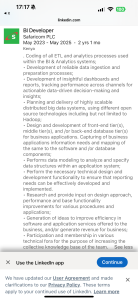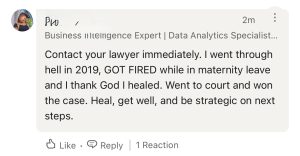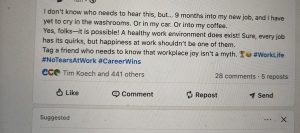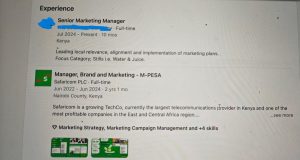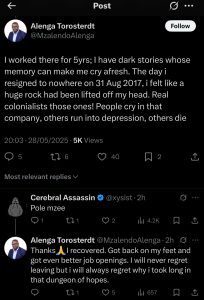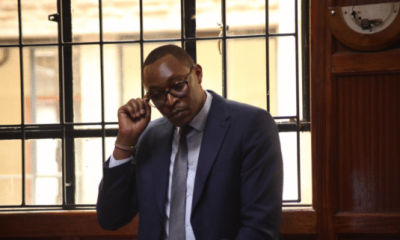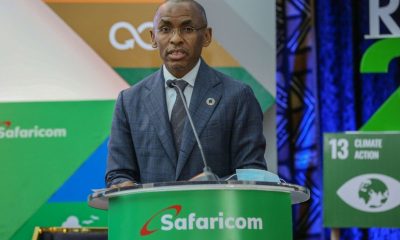Business
‘They Made Me Work From Hospital’ – Safaricom Worker Reveals Depression, Death Threats Over Toxic Work Conditions
“I was warned, under the guise of a professional meeting, that security could be sent to harass, harm, or kill me, all because I dared to advocate for myself and others like me,” Okere stated, adding with bitter resignation: “So, dear Safaricom PLC, send your security. Send them to arrest me. I am at Muthiga.”

A former Safaricom contract employee’s explosive LinkedIn posts expose a troubling culture of workplace abuse, gaslighting, and threats at Kenya’s telecom giant
In a series of deeply personal and damning LinkedIn posts that have shocked many in the Kenya’s corporate landscape, former Safaricom employee Emma Okere has lifted the lid on what she describes as a toxic work environment that pushed her to the brink of suicide and forced her to work while hospitalized for mental health treatment.
Okere’s revelations paint a disturbing picture of corporate abuse hidden behind the glossy facade of one of Africa’s most celebrated companies, raising urgent questions about workplace mental health standards and the treatment of neurodivergent employees in Kenya’s tech sector.
Working from a hospital bed
In December 2024, while battling severe depression and requiring hospitalization at Chiromo Hospital Group, Okere made a decision that would later become the center of a bitter dispute with her former employer.
Fearing for her livelihood, she asked her managers if she could continue working from her hospital bed.
“Out of fear of losing my livelihood, I asked my managers if I could continue working from the hospital. They agreed,” Okere wrote in her first post.
“Dr. Njenga, the psychiatrist overseeing my care, even facilitated this by providing a private room on the 5th floor, complete with a desk and WiFi access.”
What followed was a month of joining daily team calls, completing assignments, and maintaining her work presence despite being in what should have been a healing environment focused on rest and recovery.
However, when Okere’s contract was not renewed and she attempted to claim payment for her December work, the company’s narrative suddenly changed.
“Suddenly, I am being told that I never worked in December. That I was on leave. That I should accept this narrative so they can avoid paying me for a month I worked through both pain and fear,” she revealed.
Death threats and security intimidation
Perhaps most shocking among Okere’s allegations are claims that she received death threats during what she describes as a chilling HR meeting.
According to her account, the conversation went far beyond typical workplace discussions.
“The last time HR called me in, it wasn’t to celebrate my work. No, it was a chilling conversation where I was reminded that Safaricom PLC is a big company. Bigger than me. That they could send security after me. That I should think twice before speaking up. That I could lose everything. That I might even lose my life,” she wrote.
The threats, she claims, came after she advocated for herself and other employees, particularly those with autism, ADHD, or other conditions requiring workplace accommodations.
“I was warned, under the guise of a professional meeting, that security could be sent to harass, harm, or kill me, all because I dared to advocate for myself and others like me,” Okere stated, adding with bitter resignation: “So, dear Safaricom PLC, send your security. Send them to arrest me. I am at Muthiga.”
Disability discrimination and management callousness
Okere, who was diagnosed as neurodivergent in 2024, detailed several instances of what she characterizes as disability discrimination and shocking insensitivity from management.
In one particularly damaging allegation, she recounts a conversation with her boss that highlights the company’s apparent lack of understanding about mental health conditions.
“There’s someone in the team with cancer. I have no time to deal with your ADHD brain,” her manager allegedly told her, before making an even more disturbing comment: “I volunteer for children who have been raped by their parents, yet they are stronger than you. Move on. It’s just rape.”
These comments came as Okere was struggling with executive dysfunction, emotional dysregulation, and suicidal ideation – conditions she was battling while trying to maintain her professional responsibilities.
The personal toll has been severe.
Okere lost her father to colon cancer in 2019 and her sister Joyce to breast cancer in 2022.
While still grieving these losses and managing her own neurodivergent diagnosis, she found herself fighting not just her internal battles but also what she describes as systematic workplace abuse.
A pattern of gaslighting
Central to Okere’s allegations is what she describes as systematic gaslighting – a form of psychological manipulation designed to make victims question their own reality and sanity.
She claims that HR representatives have persistently denied that she worked during her December hospitalization, despite her having documentation and witnesses to prove otherwise.
“Let’s talk about gaslighting in the workplace, that special kind of psychological warfare where you’re made to question your reality, your sanity, and eventually your worth,” she wrote in one of her posts.
The gaslighting, according to Okere, extended beyond the work dispute to broader questions about her mental health and disability status.
“Because clearly, my neurological disorder, suicidal ideation, hormonal chaos, and mood instability are just… what? Personality flaws? Attention-seeking behavior? Laziness?” she asked rhetorically.
Corporate mental health hypocrisy
Okere’s allegations are particularly damaging given Safaricom’s public positioning on employee welfare and mental health.
Recent reports have highlighted how organizations, including Safaricom, have been urged to improve mental health and well-being support for their employees, with the company previously being recognized for its employee-focused initiatives.
“We talk so much about mental health in the workplace. But when someone actually takes the brave step of healing and still showing up, they deserve more than a cold dismissal and a financial slight,” Okere wrote, highlighting what she sees as a disconnect between corporate messaging and actual practice.
The irony was not lost on her that she was struggling with depression while working for a company consistently ranked among Africa’s best employers.
“I’ve worked hard for a company that is consistently ranked among the best employers in Africa and yet here I am, questioning whether that title is just a high-budget PR campaign while real people suffer in silence behind the scenes,” she stated.
The neurodivergent experience in corporate Kenya
Okere’s case shines a light on the broader challenges faced by neurodivergent individuals in Kenya’s corporate environment.
Her experience of being dismissed as difficult or attention-seeking reflects broader societal misunderstandings about conditions like ADHD and autism.
“And don’t even get me started on being a Black Autistic woman in tech. Double the expectations, zero the grace,” she wrote, highlighting the intersection of racial, gender, and neurological discrimination she faced.
Her struggles with executive dysfunction and emotional regulation – common aspects of ADHD – were apparently seen as character flaws rather than legitimate workplace accommodations needs.
“If I had a broken leg, I’d get a standing desk and a pep talk. But since my disability is in my brain, I get an eye-roll and a guilt trip,” she observed.
A mental health crisis in corporate Kenya
Research shows that workplace culture can significantly impact depression, anxiety, and burnout—for better or worse, and Okere’s case appears to illustrate the “worse” end of this spectrum.
Her experience suggests that despite public commitments to employee wellness, some of Kenya’s most prestigious companies may still harbor toxic cultures that actively harm vulnerable employees.
The case is particularly concerning given Kenya’s broader mental health challenges. Studies have highlighted significant gaps in mental health services in the country, making workplace support even more crucial for employees struggling with mental health conditions.
The aftermath and ongoing battle
Despite the toll on her mental health, Okere has not remained silent. Her decision to speak publicly through LinkedIn posts represents both an act of courage and desperation.
“I don’t have the energy to fight giants anymore,” she wrote, before adding: “But let it be known, I loved this company. I loved my job. I loved innovation. And I hope that one day, people like me would be safe in the boardroom.”
Her story has resonated with many professionals who see their own experiences reflected in her account.
The posts have sparked broader conversations about workplace mental health, the treatment of contract employees, and the rights of neurodivergent workers in Kenya’s corporate sector.
Currently focusing on her mental health initiative called “Akili Sawa” – a platform supporting “overthinkers, misfits, and tired gifted kids” – Okere has declared herself “vision-fully unemployed” rather than seeking traditional employment. “My wings were not made for cubicles,” she wrote in a defiant final post.
Broader implications for corporate Kenya
Okere’s revelations raise uncomfortable questions about corporate culture in Kenya’s most celebrated companies.
If her allegations are accurate, they suggest that glossy employee satisfaction surveys and wellness programs may mask more troubling realities for vulnerable workers.
The case highlights several critical issues:
- The treatment of contract workers who may lack the protections of permanent employees
- Accommodation requirements for neurodivergent employees
- The gap between corporate mental health messaging and actual support
- Power dynamics that allow managers to abuse vulnerable employees
- The use of intimidation tactics to silence whistleblowers
At the time of publication, Safaricom had not issued a public response to Okere’s specific allegations.
The company’s silence on such serious accusations – including claims of death threats and disability discrimination – may itself become part of the story.
For Okere, the battle appears to have evolved beyond seeking personal justice to advocating for systemic change.
“To anyone reading this who has ever been coerced into silence or compliance in similar circumstances: you are not crazy, and you are not alone,” she wrote.
Her case serves as a stark reminder that behind Kenya’s corporate success stories may lie untold stories of human cost – stories that demand urgent attention from regulators, corporate leaders, and society as a whole.
As workplace mental health becomes an increasingly important issue globally, Emma Okere’s courage in speaking out may serve as a catalyst for much-needed change in corporate Kenya’s approach to employee welfare, disability rights, and mental health support.
This story continues to develop as more details emerge about workplace conditions at major Kenyan corporations and the treatment of vulnerable employees.
Kenya Insights allows guest blogging, if you want to be published on Kenya’s most authoritative and accurate blog, have an expose, news TIPS, story angles, human interest stories, drop us an email on [email protected] or via Telegram
-

 Grapevine7 days ago
Grapevine7 days agoAlleged Male Lover Claims His Life Is in Danger, Leaks Screenshots and Private Videos Linking SportPesa CEO Ronald Karauri
-

 Lifestyle1 week ago
Lifestyle1 week agoThe General’s Fall: From Barracks To Bankruptcy As Illness Ravages Karangi’s Memory And Empire
-

 Grapevine3 days ago
Grapevine3 days agoRussian Man’s Secret Sex Recordings Ignite Fury as Questions Mount Over Consent and Easy Pick-Ups in Nairobi
-

 Investigations2 weeks ago
Investigations2 weeks agoEpstein Files: Sultan bin Sulayem Bragged on His Closeness to President Uhuru Then His Firm DP World Controversially Won Port Construction in Kenya, Tanzania
-

 News2 weeks ago
News2 weeks agoAUDIT EXPOSES INEQUALITY IN STAREHE SCHOOLS: PARENTS BLED DRY AS FEES HIT Sh300,000 AGAINST Sh67,244 CAP
-

 Business2 weeks ago
Business2 weeks agoKRA Can Now Tax Unexplained Bank Deposits
-

 Investigations1 week ago
Investigations1 week agoEpstein’s Girlfriend Ghislaine Maxwell Frequently Visited Kenya As Files Reveal Local Secret Links With The Underage Sex Trafficking Ring
-

 News1 week ago
News1 week agoState Agency Exposes Five Top Names Linked To Poor Building Approvals In Nairobi, Recommends Dismissal After City Hall Probe

